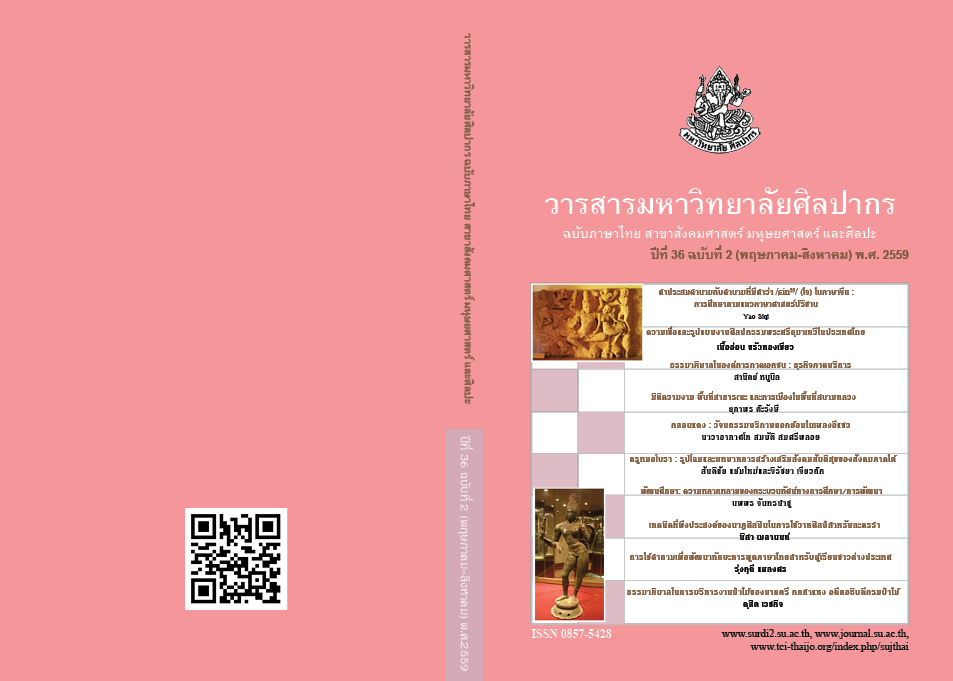พัฒนศึกษา: ความหลากหลายของกระบวนทัศน์ทางการศึกษา/การพัฒนา (Development Education: Diversity of Paradigms in Education/Development)
Main Article Content
Abstract
ความหมายของพัฒนศึกษามีการเปลี่ยนแปลงตลอดเวลา นับตั้งแต่การเป็นศาสตร์แห่งการศึกษาเพื่อพัฒนามนุษย์ให้นำไปสู่การพัฒนา ศาสตร์แห่งการเรียนรู้เรื่องการพัฒนา ไปจนถึงศาสตร์แห่งการสร้างความรู้ใหม่ ด้วยเหตุนี้ความรู้ทางพัฒนศึกษาในการทำความเข้าใจปัญหาและการแก้ไขปัญหาทางการศึกษาและการพัฒนา จึงมีความหลากหลายของกระบวนทัศน์ทางความรู้ บทความวิชาการนี้จึงมุ่งอภิปรายถึงกระบวนทัศน์ทางความรู้ 4 ชุด ที่ประกอบด้วย ปฏิฐานนิยม หลังปฏิฐานนิยม ทฤษฎีวิพากษ์ และสร้างสรรค์สังคม กระบวนทัศน์แต่ละชุดจะมีฐานคิดของการมีอยู่ของความรู้/ความจริง และวิธีวิทยาที่ว่าด้วยความรู้/ความจริงแตกต่างกัน การทำความเข้าใจปัญหาทางการศึกษาและการพัฒนาภายใต้ความหลากหลายของกระบวนทัศน์ทางความรู้ ย่อมทำให้วิธีการแก้ไขปัญหามีความเหมาะสมกับบริบทแวดล้อมที่เปลี่ยนแปลง และสามารถสร้างความเสมอภาคและศักดิ์ศรีแห่งความเป็นมนุษย์
Downloads
Article Details
References
Charoensin-o-larn, C. (2011). Development Discourse: Power Knowledge Truth Identity and Otherness. (วาทกรรมการพัฒนา : อำนาจ ความรู้ ความจริง เอกลักษณ์ และความเป็นอื่น) (5th ed.). Bangkok: Wipha
Development Education.ie. (2007). Definitions of Development Education. [Online]. Retrieved March 4, 2015
from https://www.developmenteducation.ie/teachers-and-educators/transition-year/DevEd_Explained/Resources/DEEEP.pdf.
Glaser, B. G. (1992). Basics of Grounded Theory Analysis. Mill Valley. C.A.: Sociological Press.
Guba, E. G. and Lincoln, Y. S. (1994). Competing Paradigms in Qualitative Research.” In Handbook of Qualitative Research, edited by Denzin, N.K.and Lincoln, Y.S. London: Sage Publication.
Havanon, N. (1986). The Conception Body of Development Education (องค์ความคิดทางด้านพัฒนศึกษาศาสตร์). In Development Education: Science of Development Learning and Transition, edited by Havanon, N. Bangkok:Graduate School Srinakharinwirot University.
Havanon, N. (2003).The Methodology in Knowledge for Community Robustness (วิธีวิทยาในการสร้างความรู้เพื่อความเข้มแข็งของชุมชน). Epistemologyfor Knowledge Construct for Community and Social Robustness.Academic Seminar Paper in Her Royal Highness Princess Maha Chakri Sirindhorn Day. Srinakharinwirot University, Bangkok, Thailand.Wednesday 19th November 2003.
Havanon, N. (2007). Constructing Knowledge within Social ConstructivismParadigm (การสร้างความรู้ภายใต้กระบวนทัศน์สร้างสรรค์สังคม). Journal of Mekong Societies, 3(3): 1-24.
Havanon, N. (2009). Narrative Approach: The Turning Point of Social ScienceResearch (วิธีการศึกษาเรื่องเล่า : จุดเปลี่ยนของการวิจัยทางด้านสังคมศาสตร์).Journal of Mekong Societies, 5(2): 1-22.
Juathai, J. (2008). The Construction of Disable Self Identities. (การสร้างอัตลักษณ์แห่งตัวตนของคนพิการ).
Doctoral’ s dissertation, SrinakharinwirotUniversity, Bangkok, Thailand.
Kondsetthagul, N. (2006). The Constitution of Garbage Collector as the Otherness (การสถาปนาความเป็นอื่นให้คนเก็บขยะ). Doctoral’ s dissertation, Srinakharinwirot University, Bangkok, Thailand.
Laophuangsak, P. (2014). Development of Management Model for Community Enterprise’ s Cluster for Enhancing Competitiveness of Community Economy in Western Region (การพัฒนารูปแบบการจัดการเครือข่ายวิสาหกิจชุมชนเพื่อเสริมสร้างความสามารถในการแข่งขันของเศรษฐกิจชุมชนในพื้นที่ภาคตะวันตก). Doctoral’ s dissertation, SilpakornUniversity, Nakhon Pathom, Thailand.
Lincoln, Y. S. and Guba, E. (2000). Paradigmatic controversies, contradictions, and emerging confluences. In Handbook of Qualitative Research (2nd ed), edited by Denzin K. and Lincoln, Y.S. London: Sage publication
Moules, N.J.(2002). Hermeneutic Inquiry: Paying Heed to History and Herms-An Ancestral, Substantive, and Methodological Tale. International Journal of Qualitative Methods, 1(3):1-40. [Online].Retrieved March 4, 2015. from https://www.ualberta.ca/~iiqm/backissues/1_3Final/pdf/moules.pdf.
Pothisita, C. (2011). Paradigm and Social Knowledge Inquiry (กระบวนทัศน์กับการแสวงหาความรู้ทางสังคม). In New Imagination of Sociology, edited by Archavanitkul, K. Bangkok: Institute for Population and Social Research.
Ratanarojsakul, P. (2002). Community Capital: Underlining Conditions for the Survival of LocalCommunity within Capitalism (ทุนชุมชน: เงื่อนไขในการดำรงอยู่ของชุมชนในระบบทุนนิยม). Doctoral’ s dissertation,Srinakharinwirot University, Bangkok, Thailand.
Sirichai, L. (1986). Development Education, Study from Doctoral’ Dissertation (ทิศทางพัฒนศึกษาศาสตร์ ศึกษาจากปริญญานิพนธ์ของนิสิต). In Development Education: Science of Development Learning and Transition, edited by Havanon, N. Bangkok: Graduate SchoolSrinakharinwirot University.
Strauss, A. and Corbin, J. (1990). Basics of Qualitative Research: Grounded Theory Procedures and Techniques. Newbury Park, C.A.: Sage.
Suwannaka, Y. (2000). The Effect of Empowerment Education Process on Family Health Leader Development (ผลของกระบวนการศึกษาเพื่อสร้างพลังที่มีต่อการพัฒนาแกนนำสุขภาพประจำครอบครัว). Doctoral’sdissertation, Chulalongkorn University, Bangkok, Thailand.


